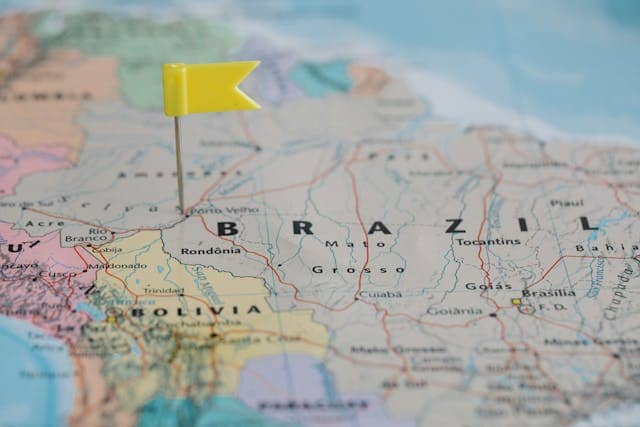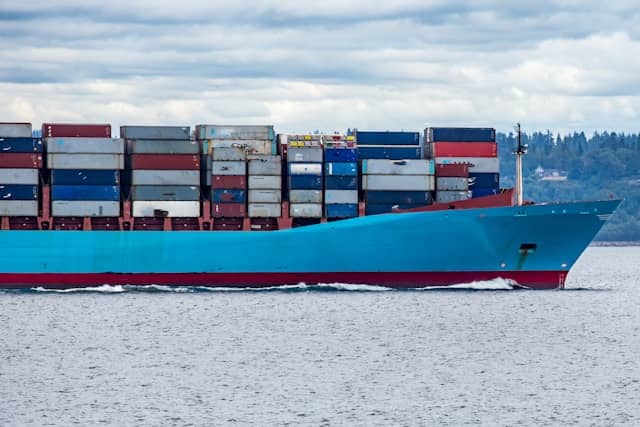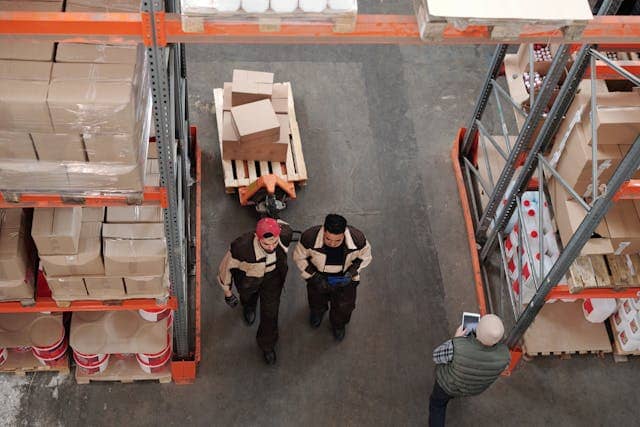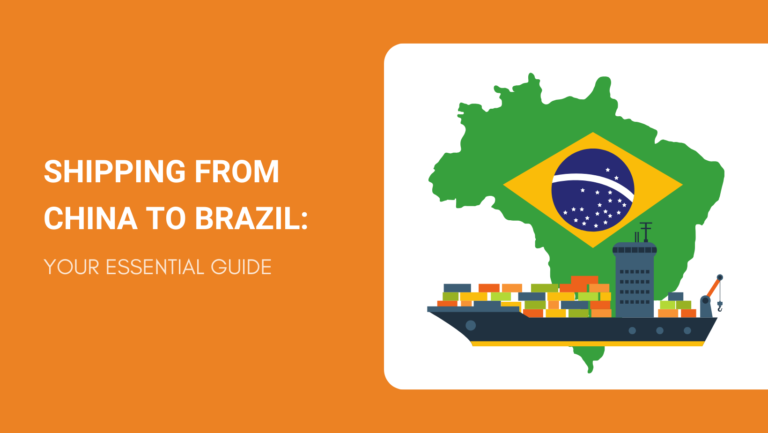Shipping from China to Brazil has become an integral part of global trade, reflecting the robust economic ties between the two countries.
Whether you’re a seasoned importer or starting out in the e-commerce space, understanding the nuances of transporting goods across such distances is crucial.
Choosing the right shipping method and understanding the various routes available can significantly impact your overall costs and ensure timely delivery.
Balancing factors such as transit times and shipping schedules, while adhering to the customs and regulations of both countries, is paramount.
In helping you through these considerations, this article stands as a comprehensive guide aimed at demystifying the intricacies of shipping from China to Brazil, empowering you to make informed decisions for your business.

Shipping Method from China to Brazil
When you’re considering shipping from China to Brazil, you’ll primarily choose between two methods: ocean freight and air freight. Your decision will depend on several factors including budget, cargo size, and time sensitivity.
Ocean Freight
With ocean freight, you can opt for a Full Container Load (FCL) or Less than Container Load (LCL).
- FCL Shipping: Your goods will have an exclusive container, which can be more secure and faster since you don’t share space; but it’s generally costlier for lighter shipments.
- LCL Shipping: Ideal for smaller shipments as you pay only for the space you use; however, shared containers may add to the transit times due to additional logistics.
Air Freight
Air freight is the go-to for time-critical freight, promising transit times that are considerably shorter than ocean transit.
- Speed: You can expect delivery in about 5-7 days, making it favorable for perishable goods or urgent shipments.
- Cost: Typically, air freight comes at a premium and is based on both weight and dimensions of shipments.
Here are some tips to help you decide:
- Assess your budget; if it allows for a higher rate, air freight may be suitable for urgent cargo.
- For heavy or bulky items, ocean freight is often the most economical choice.
- Verify the transit times; critical deadlines justify the higher cost of air shipping.
Shipping Routes
When shipping from China to Brazil, you’ll typically choose between sea freight and air freight. Each has its distinct routes and key ports of departure and arrival.

Sea Freight
Your goods will likely enter the vast blues via major ports such as the Port of Shanghai, the world’s busiest container port, or the Port of Shenzhen, which is known for its high efficiency.
Other significant Chinese ports include Ningbo, Qingdao, Guangzhou, and Xiamen.
The oceanic journey usually features two segments: from China to the South America East Coast (SAEC) and then to Brazil’s coast, with notable Brazilian ports like Rio de Janeiro or Santos welcoming your goods.
- Shanghai ➔ SAEC ➔ Brazil
- Shenzhen ➔ SAEC ➔ Brazil
These shipping routes take 26 days on average depending on the specific port in Brazil.
Top-Rated China Freight Forwarder
Expert Shipping Solutions for Your Needs
Air Freight
For a faster delivery, air freight is your go-to, with key airports operational in the same cities as sea ports.
Although a quick option, it’s important to note air shipping is typically more expensive, especially with the added distance from China to Brazil.
Your cargo could be airborne from hubs like Shanghai Pudong International Airport or Shenzhen Bao’an International Airport.
Remember, while ocean freight usually offers more capacity and better rates for larger shipments, air freight is ideal for time-sensitive deliveries.
When planning your shipment, factor in both the type of cargo and your deadline to determine the best route for your needs.
Cost Considerations When Shipping from China to Brazil
When planning to ship goods from China to Brazil, understanding the cost implications is crucial for your budget. The shipping cost is influenced by multiple factors which can affect the final price you’ll pay.
Key Factors Affecting Shipping Costs:
- Weight and Dimensions: The weight and size of your shipment are primary determinants of cost. Heavier and larger items generally lead to higher expenses.
- Container Shipping: Opt for FCL shipping if you have enough goods to fill an entire container, which can be more budget-friendly. Otherwise, LCL shipping allows you to pay only for the space you use.
- Pallets: Ensure your goods are properly palletized, as this can affect handling and, therefore, costs.

Below is a table with estimated pricing to give you an idea of what budget to prepare:
| Shipping Type | Estimated Cost |
| LCL Shipping | $10 – $80 per CBM |
| 20FT Container | $3,000 – $3,300 |
| 40FT Container | $3,200 – $3,500 |
| Air Freight | $7 – $8.7 per kg |
Note: These are broad estimates and can vary based on specific circumstances.
While costs will fluctuate, choosing an economical option without compromising the security and speed of your shipment is vital.
Stay aware that different regions in Brazil may incur different costs, and the cost difference between shipping from various parts of China can also play a significant role.
Always verify with your chosen logistics provider for the most current rates and options available to suit your shipping needs.
Transit Times and Scheduling
When you’re shipping from China to Brazil, understanding the transit times is crucial for planning your logistics efficiently. Typically, transit times can vary depending on the method of shipping you choose.
For air cargo, the journey usually spans between 3 to 7 days, a suitable option when you have time-critical freight that needs to reach Brazil quickly.
If the cargo volume spikes due to market demands, these times may stretch slightly. Some freight forwarders offer a good measure for urgent shipments.
Sea freight, contrastingly, takes a longer duration. Normally, you’re looking at about 26 to 45 days for your items to reach Brazil, with factors like customs procedures and specific shipping routes playing a role in this timeline.
Ships have weekly departures, so you’ll have flexibility in planning your shipments.
Keep in mind that freight transit times are subject to change due to unforeseen circumstances, such as weather patterns or port delays. Be sure to stay updated on the schedules provided by your freight forwarder.

Here’s a summary table to help you visualize the average transit times:
| Shipping Method | Transit Time | Weekly Departures |
| Air Cargo | 3 – 7 days | Varies |
| Sea Freight | 26 – 45 days | 2 – 4 times a week |
Remember, staying informed about the shipping schedule can help you manage your inventory and supply chain much more effectively. Always factor in a small buffer when you’re planning for time-critical shipments to account for any potential delays.
Navigating the complexities of customs and regulations when shipping from China to Brazil is essential for smooth operations.
Enlisting the services of a knowledgeable China freight forwarder can greatly simplify this process, as they specialize in managing cargo movements and understanding the intricacies involved.
Required Documentation
Your shipment will need the following documents for customs clearance:
- Certificate of Origin: Verifies your merchandise’s origin.
- Packing List: Details the contents, weight, and packaging specifics.
- Invoice: Lists the value and description of the goods.
Ensure accuracy and completeness of these documents to prevent delays.
Working with a Freight Forwarder
Choose a freight forwarder experienced in Sino-Brazilian trade to help you with:
- Customs Clearance Fees: They will guide you on the fees applicable to your cargo.
- Cargo Insurance: They can also help arrange protection for your shipment against loss or damage.
Prohibited and Restricted Items
Brazil prohibits certain items and places restrictions on others. It’s critical to confirm that your cargo complies with these regulations to avoid complications.
For Success in Customs:
- Confirm all documents are present and accurate.
- Verify your products aren’t prohibited.
- Use a trusted freight forwarder for advice on customs fees and insurance.
For in-depth information on customs regulations, visit Brazil – Customs Regulations provided by the International Trade Administration.

How to Choose a Reliable Freight Forwarder
When shipping from China to Brazil, selecting a trustworthy freight forwarder is essential for a smooth supply chain management. Here’s a simple guide to help you:
1. Research
Start by researching potential freight forwarders. Look for those with expertise in China-to-Brazil transportation, ensuring they’re experienced in the specific nuances of this trade lane.
2. Services Offered
Ensure the freight forwarder offers a range of services, like door-to-door, door-to-airport service, and even charter service if necessary. It’s important they can handle all aspects of freight, from pickup to delivery.
3. Reliability Check
Check their reliability by reading customer reviews and asking for references. A reputable forwarder should be transparent and proud to showcase its successful shipments.
4. Accreditations
Verify their industry credentials. Reliable freight forwarders are often members of international freight organizations and have various certifications.
5. Communication
Assess their customer service. Prompt and clear communication indicates a forwarder prioritizes its clients’ needs and is more likely to provide a hassle-free transportation experience.
6. Price and Contract
While affordable rates are attractive, understand what is included in the price. Clarify terms regarding additional fees so as to avoid any hidden costs.
Top-Rated China Freight Forwarder
Expert Shipping Solutions for Your Needs
FAQs about Shipping from China to Brazil
Shipping from China to Brazil raises several questions, especially regarding direct orders, customs processes, and associated fees. The answers provided here draw directly from export and import regulations and trade practices.
Can I Order Products from Alibaba and Have Them Shipped Directly to Brazil?
Yes, you can order products from Alibaba and have them shipped to Brazil. When placing your order, choose a supplier that offers delivery to Brazil.
It’s important to select a reliable freight forwarder as they will handle the shipping and importation process on your behalf.
How Long Does Customs Clearance Take in Brazil?
Customs clearance in Brazil can vary, but typically it takes between 7 to 14 days.
This process may be longer if there are discrepancies in documentation or during busy periods. Ensure all your documents are in order to avoid unnecessary delays.
How Much Is the Customs Fee in Brazil?
Customs fees in Brazil can be complex due to various taxes. Import duties, Industrialized Product tax (IPI), and other taxes like PIS and COFINS contribute to the total fee.
Expect to pay between 10% and 35% of the CIF value (Cost, Insurance, and Freight), depending on the product category. Reference the Brazilian Revenue Service for the latest tariff schedules.
Concluding Insights: Shipping from China to Brazil
When considering the export and import dynamics between China and Brazil, it’s crucial to look at both the challenges and opportunities.
Efficient transportation and the careful planning of shipments can significantly impact the success of your trade endeavors.
If the nuances of international shipping seem daunting, it’s beneficial to partner with a knowledgeable team.
For a comprehensive solution that covers all aspects of your shipping needs, consider our freight forwarding services.
We offer end-to-end logistics support, managing everything from pickup at the Chinese supplier to final delivery in Brazil. Our expertise can help you navigate the complexities of international shipping, optimize costs, and ensure timely deliveries.
To get started with a tailored shipping plan that includes freight forwarding, request a freight forwarding quote today. Let us help you streamline your China-to-Brazil trade operations, providing you with both sourcing expertise and seamless shipping solutions.
If you need a quick quote on sourcing goods, consider reaching out to us at NicheSources. We’ll guide you through the complexities of global trade, ensuring a successful shipping process.

